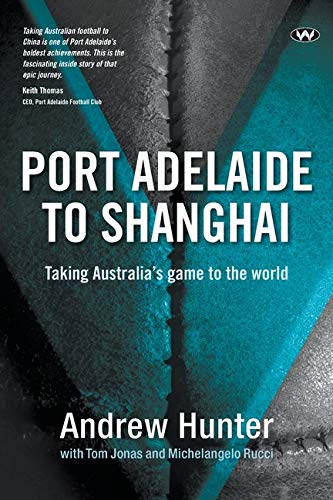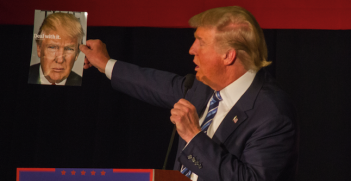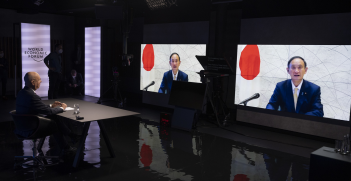Book Review: Port Adelaide to Shanghai – Taking Australia’s Game to the World

International relations are more than just government. With relations between Canberra and Beijing at a stalemate, the story of AFL team Port Adelaide’s audacious push into China reminds us of the choice between insularity and international engagement.
Author Andrew Hunter, Port Adelaide’s General Manager for China Engagement, will speak at AIIA Victoria on 25 February. Register here to attend in-person or online.
Port Adelaide to Shanghai – Taking Australia’s Game to the World charts the club’s journey to play three games in Shanghai and reach the biggest-ever audience for a broadcast home-and-away game. While some accused the club of “digging a hole to China,” Port Adelaide’s insight was that in order to grow, it needed to look beyond the parochial – acknowledging it represented one suburb of a city of a country of 25 million – and engage with the wider world.
The sports industry in Australia is highly contested, with around 90 professional sporting teams. In Andrew Hunter’s words, the “successful clubs will be those that stay ahead of history’s curve.” There’s a clear international imperative: “If our sport fails to reach an international audience, it will ultimately court irrelevance.”
The book outlines the stages of the club’s journey. First, it built a compelling narrative to motivate the group to push through the traditional boundaries of what was considered possible. Second, it built relationships over the long-term. Then, it took opportunities when they beckoned – such as when Prime Minister Malcolm Turnbull was looking for a positive announcement on his first official visit to China. And it had to deal with roadblocks – not least the deteriorating official relationship between Australia and China which is detailed in the book.
To succeed, Port Adelaide had to identify what it could offer. Hunter cites as the club’s strongest offering its ability to connect with Australia through the community reach of sport. For Chinese companies, sport provides a window into Australian culture and builds bonds and connections. In the other direction, Australia can show itself at its best through sport. For the first match in Shanghai, local law enforcement was cautious, questioning whether there was a history of violence between Australian Football League (AFL) fans. They were to be pleasantly surprised.
Beyond the club’s own commercial success, Port Adelaide’s efforts had wider benefits for Australia’s diplomacy and trade, from providing a way to connect with Premier Li Keqiang during his state visit, to promoting Australian produce at a Taste of Australia festival. The attendance of Minister for Trade Steven Ciobo at the 2018 match was the first ministerial visit in eight months, ending round one of China’s diplomatic freeze.
But it is clear that, quite apart from the official relationship, the author believes deeply in the value of building international understanding. He sees the purest form of sports diplomacy as being born of genuine people-to-people exchange. His satisfaction was in creating what he describes as “a moment, mutually positive and unthreatening, that could capture the imagination of the Australian people” while sharing “a unique aspect of Australian culture with China, for mutual benefit and understanding.”
One lovely aspect of the book was a contribution by the head of the Port Adelaide Cheer Squad who, having attended every game since 2011, obtained a passport and made his first trip outside Australia to be at the match. He found his world expanded, stating “I didn’t know much about the place…. and thought it would be a bit uptight. But it wasn’t like that at all.”
You don’t have to be an AFL fan to enjoy this book. It is equally relevant to a range of pioneers – from businesses trying to expand internationally, to those in the arts and cultural sector. As Andrew Hunter describes it: “A good game – a game well played or nail-bitingly close – is a captivating mixture of competition, drama and art.”
It is also relevant for those trying to embrace diversity at home to see the connections with international outreach. The book describes Port Adelaide’s efforts to welcome international students into the Australian community and its program to take Aboriginal Academy players to China. Hunter writes: “If footy clubs are to remain true to their traditional role of binding communities, they must continue to welcome and involve the community in all its diversity.” There is a great anecdote of how sport helped reduce community tensions after the Gold Rush with an 1892 Chinese Goldfields Leagues match.
Right now, Australia-China relations are at a low point. International engagement seems increasingly suspect. With borders closed due to COVID-19, Australia is at real risk of cutting itself off from the world. It is a good time to remember the benefits of international engagement and being open to the world.
This is a review of Andrew Hunter, Port Adelaide to Shanghai: Taking Australia’s Game to the World (Wakefield Press, 2020). ISBN: 9781743057988 (paperback) & 9781743058213 (Ebook).
Melissa Conley Tyler FAIIA is Research Fellow in the Asia Institute of The University of Melbourne. She served as National Executive Director of the Australian Institute of International Affairs for 13 years and was honoured as a Fellow of the AIIA in 2019.
This article is published under a Creative Commons Licence and may be republished with attribution.





